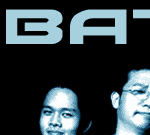
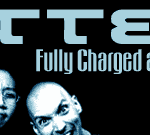
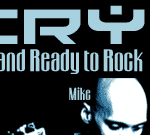
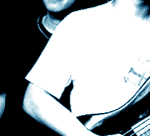

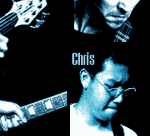

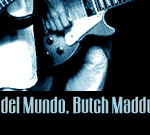
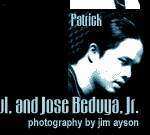
         |
|
Philmusic.com sits down with Battery and talks with them about their debut album, their dreams to go international, and playing the 'devil's music' while not minding being tagged as the 'Reverends of Rock'. Their music represents some of the best of what passes as “Pinoy Rock” nowadays, which is pretty unusual since the guitarist/vocalist, a tall white dude with an American twang, doesn’t speak our native tongue. At first glance, their bassist looks more like a bespectacled computer geek rather than the virtuoso player that he turns out to be. And their drummer - well, he looks too shy to be in a rock band of this caliber. Of course, these are but a few misconceptions hounding Battery, composed of Michael Turner (vocals/guitars), Chris Salva (bass), and Patrick Dy (drums). The other fallacies become quite obvious in their self-titled debut album under Rock Records which has lyrics like “You come to me when I can’t see/You come to me when I call/You come to me when I can’t see/You comfort me when I fall” (from "Come to Me"). Or “In a world where all kinds of people have to live/Life becomes a hell for those who’d rather take than give” ("Toxic Hate"). The trio still manages to play the meanest rock there is these days while surviving the phrase “Preachers of Rock” due to their Christian background. Mike Turner, former guitarist of The Breed, quickly points out the phrase should be “Reverends of Rock”. But whatever label you stick them with, Battery will choose to shrug these off for their carefree and honest belief that “music is music”. And this, through careful observation, gives them that incredible tightness when they perform on stage. We find that tightness off stage as well when we tagged along for an evening rehearsal at the Victory Christian Fellowship’s studio in Pasig. Even with unusual covers like the BeeGees’ “Staying Alive” and James Taylor’s “Fire and Rain”, Battery never seems to lose their verve. Whether or not this verve is the root to the so-called “devil’s music” that they perform is really up to the listener. And besides, they really don’t mind the holy name-calling. Mike quips, “You should hear our Sunday service.”
Starbucks, Emerald Avenue, Ortigas
Center. 6 p.m. PhilMusic: In all the interviews I’ve read about you guys, it doesn’t really mention when and why [original members] Johnny Besa [bass] and Miguel Ortigas [drums] left Battery... Mike: Oooh, goes right for the dirt! [laughs] No, that’s easy. ‘Why?’ because we just wanted to do different things. Johnny had started playing with Blue Rats and Miguel was at school at that time (computer school), and at that time Miguel just didn’t want to do anything basically. He just wanted to go to school and get into business. Now he’s playing again but then he wasn’t. Johnny wanted to have a regular club gig and I didn’t. I wanted to get a record deal and do my own music and we said ‘we’re not going to keep working together’ because what I wanted to do was not that. I don’t want to become more of a club band. I want to become more of a recording artist. But, yeah, we’re still good friends.
Mike: The two other guys I knew because they were going to the same church and then we sessioned together. Actually Chris and I had played together and Patrick and Chris were playing with another band. And Chris was playing lead guitar and I was playing bass at the time with this other band. And so we thought, ‘maybe we should get together, the three of us’, to put together a band. PhilMusic: So how did you find Chris Salva and Patrick Dy? Mike: The two other guys I knew because they were going to the same church and then we sessioned together. Actually Chris and I had played together and Patrick and Chris were playing with another band. And Chris was playing lead guitar and I was playing bass at the time with this other band. And so we thought, ‘maybe we should get together, the three of us’, to put together a band.
Mike: It wasn’t our band. It was another guy’s band called Pigs with Pearls. And we did some provincial gigs, traveled around with that band. So that’s how we met. Songwriting, Yordi, and Management
PhilMusic: Who writes most of your songs? Mike: We all write. I wrote the lyrics but I can’t write them if they’re in Tagalog. Patrick: So that’s our next gimmick for the next album. He’ll sing something in Tagalog. Mike: Yeah, we’re working on it. We might do a remake. We’ll see. But we all write the music. We just got together and throw it all in.
Mike: No, sometimes it’s simultaneous. Patrick:
But for the first six months, it was mainly Mike’s material. Mike: Yeah, even until now I’ll walk in and say, ‘I’ve got this song. I’ve got the verses. I’ve got the chorus, and then he [Patrick] goes, ‘That sucks.’ So I say, ‘Okay, I’ll change it.’ So by virtue of him saying it sucks, he has a hand in melody. Patrick: So probably for the next album, it’s going to be more of a complete band. Mike: If you look at the CD, the songs that were written by all of us, the next album will be more like those songs. And even move in a different direction, too. The stuff that sounds older in the album were probably the songs by me.
Mike: That’s my son. PhilMusic: How do you play that live? Mike: CD. We've got a great sound man as the fourth member.
Patrick: We’ve got our own business. Mike: We're our own bosses. Patrick: We have a music school and a photo shop. And Chris is an air-conditioning contractor.
PhilMusic:
So how old are you guys? PhilMusic: Who paid for your Pulp CD? Mike:
Pulp. Mike: No. It was already done. That was just a pre-mix. That was not the final mix. Vernon liked it and said, ‘Let’s do it!’ And actually, that particular cover, they had approached another band for the cover. But the band didn’t want to do it. So we said we’d do it. We were the first band, too, to have been on the cover. It could’ve been anybody. Why us? It could’ve been any number of bands. We were very thankful. We were originally going to dress as a priest and nuns. [laughter] But I thought to myself, ‘Two of us are going to have to be nuns.’ [laughter] So we decided not to do that. Plus Yordi might get mad at us.
Mike: No, Yordi is our fourth member. He’s our sound man. We don’t do gigs without our sound man.
Mike: Roxanne Lapus, First Name Management, Co. Patrick: She also handles Raymond Lauchengco, Tadao Hayashi... Mike: They’re the high-end, we’re the low-end. [laughter] We’re her only rock band. She has another band that’s a showband, Tribe of Levi. It’s like an R&B band...Then Brian just joined because we really needed someone to be a point person for us. He’s been hired by First Name to work with us.
MP3s, the Net, and the Napster case PhilMusic: Have you ever tried putting your songs up on the Internet? Mike: We already have songs out on the Internet. I think we’re gonna put the techno version of “Toxic Hate” as an MP3.
Mike: That will be the song people can get for free as an MP3. That was really Mally’s experiment which scared me. I was surprised people liked it. It was kinda hard to balance back-to-back because people would start thinking, ‘They’re a techno/rock band’. And that’s totally not what we are at all.
Mike: Go Metallica! It’s not right for people to get music from an artist without the artist getting reimbursed for it. Patrick: If Napster is making money from the sponsors, then the artist should also get his royalty. Mike: Plus, if anyone can get my songs for free on the Internet, why should they buy my CD?
Mike: Sometimes one or two songs is the album. Chris: You get one or two songs from ten bands, and that is an album. Patrick: And most of the people who buy the album, buy the album for one or two songs. Mike: I think it’s okay to put part of the song. Patrick: Yeah, excerpts. Mike: Or put the whole song if there’s a way to get reimbursed for it. Especially here, man. The artist gets ripped off bad enough as it is. Here it’s the opposite. Anywhere else in the world, the radio station pays you every time they play your song. Here you have to pay them. So that’s a whole separate article.
On the album material and doing covers PhilMusic: How did you conceptualize the album? Patrick: It was more of a transition. When we got together the first few months, it was all Michael’s material. And then for the remaining months, that’s when we came in because we were still looking for more songs.
Mike: No. It’s just a debut album. Our only theme is none of these songs are fillers. So it felt like every song was a good song. With some albums, there are three good songs and the rest are kinda ‘eh’. We feel that every song in this album was real strong. That’s the challenge for the next one. To write really good songs, to not have one ‘eh’ - this song really sucks. There were songs we didn’t record. We were literally in the studio going, ‘No, let’s not record this one’.
Patrick: “Coming Home”, “Come to Me”. Mike: 'Rage'. Chris: 'Too Late to Pray'.
Mike: Yeah. I think we are eclectic because we come from such different backgrounds. Because the stuff they grew up on were not the stuff I grew up on. So his [Chris] guitar-playing was influenced by Steve Vai, Mr. Big, the glam stuff, whereas, the time that came out, I was already influenced by earlier stuff. And Patrick is jazz-oriented. He’s not familiar with any hard rock drummer. He could name you about four. So it’s a pretty good blend. Whereas with the other guys [of The Breed], we pretty much had the same influences, which is kinda stagnating because we didn’t have much else to draw from. Even some of the songs in the album, I used to do different. Then Patrick came in. He put in a whole different drumbeat, so we changed it. PhilMusic: Why don’t you do covers? Mike: Well, you know why we don’t? Because we suck. [laughter] It’s like there are two different types of musicians, just like there are two different types of painters. There’s somebody who can do this, but you wouldn’t necessarily want this guy to paint your house because he may not be that good in painting houses. There are artists who are great copiers, but they suck when it comes to originality. Well, we’re the opposite. There are guys who can blow you away and play note for note somebody else’s solo. I don’t want to try and do that because I can’t. So you don’t want to be a cover band because for one, we don’t want to be one, and I don’t think we could do it anyway. Patrick: But we still do covers but in a different arrangement. Mike: We wouldn’t do it exactly like, you know... Chris: Our own interpretation.
Mike: I just got to get these guys to sing the high parts. [laughter] I know a lot of guitar players. Man, they can play like Yngwie Malmsteen. I have a relative who has a Ph.D. in organ performance. Imagine, she can sit there and play like Bach and stuff, but she couldn’t sit down at the keyboards and just improvise. She’s clueless. So there are musicians like that. A lot of guys are great technically and stuff, but of you ask them to write a melody, they go, ‘Ah, huh?’ So we’re just trying to work more on our own sound.
Chris: We just go home and rest. Usually when you’re tired, your mind just doesn’t work anymore. Mike: We practice and practice and say, ‘Remember this one part because this is good.’ I guess we really should just tape it. Chris: Also when we don’t play a long time, and then we meet, it’s usually better. Patrick: So let’s skip practice tonight! [laughter] For the past two months, we were just practicing but there were no gigs so we were getting stagnant. How long ago was the album ready? For months ago, right? Mike: Was it all ready that long time ago? Chris: Three months ago. Mike: And that’s what we really needed because there’s a glut of good bands with CDs. If you’re a club owner, who are you gonna get? The guy who already has a release or the guy who doesn’t? So it definitely helps.
Mike: I don’t know if it will happen that way. But it might be we do better abroad first. It’s just the way the scene is. So we’ll see what happens. Our goal is just to concentrate here right now. Patrick: Hopefully we get distributed in Asia. Rock Records is very strong in Asia.
Mike: Yeah, I think it helped. Every little bit helps. I think Pulp probably helped more than the NU project. I wasn’t really happy when the NU project came out. I think Pulp supplied more promotions than “In the Raw”. Patrick: Yeah, they have access to more pop/rock people. Mike: I wasn’t happy with the final product of “In the Raw” either. I didn’t like the way it sounded. If you would sit down and listen to our “In the Raw” and listen to our final cut, it’s a whole different sound. Actually it’s the finished song in “In the Raw” but the production, the final mastering is not the same as what we did. So there’s a huge difference if you listen to them back-to-back. But that was out of our hands. They just basically asked everybody, ‘Hey, do you want to be part of this? We’ll pay you. We won’t keep your songs.’ And we went, ‘Okay, sure.’
Mike: We had a fun time. So what do you guys think of the launch?
Mike: Like, why? You expected us to preach? [laughter] - end - |
|
Our thanks to Jim Ayson of Philmusic.Com. |